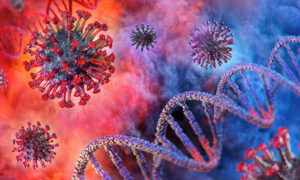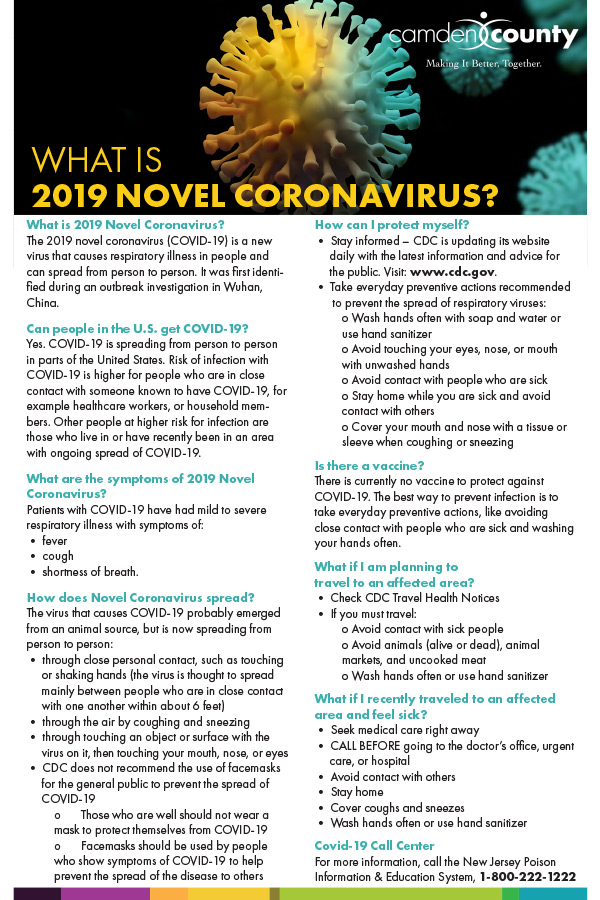 (Gloucester Township, NJ) – With the recent identification of New Jersey’s first case of novel coronavirus (COVID-19), the Camden County Department of Health is ramping up its efforts to prepare for the event that coronavirus arrives in our community. The Department is continuing to closely monitor reports and guidance from the Centers for Disease Control and Prevention (CDC) and the New Jersey Department of Health.
(Gloucester Township, NJ) – With the recent identification of New Jersey’s first case of novel coronavirus (COVID-19), the Camden County Department of Health is ramping up its efforts to prepare for the event that coronavirus arrives in our community. The Department is continuing to closely monitor reports and guidance from the Centers for Disease Control and Prevention (CDC) and the New Jersey Department of Health.
“The immediate risk to our community remains low, however it is important to be realistic about this threat and to prepare accordingly,” said Camden County Health Officer Dr. Paschal Nwako. “Based on what we know about this virus, it spreads the same way as most respiratory illnesses. That means that the most effective means of prevention is to wash your hands frequently and properly, and to exhibit other good hygiene practices.”
The New Jersey Department of Health announced the state’s first presumptive positive case of coronavirus, a 32-year-old man from Bergen County, on March 4. The individual is being treated at Hackensack University Medical Center and has reportedly been placed in isolation at the facility.
As of noon, on March 5, the CDC is reporting 99 confirmed cases of coronavirus throughout the United States. There are currently no known cases of coronavirus in Camden County.
Nwako and other public health officials are continuing to urge Camden County residents that the best way to protect yourself from contracting or spreading viruses is to demonstrate good, common hygiene practices, including:
- Covering your nose and mouth with a tissue or sleeve when coughing or sneezing
- Washing your hands properly and often with soap and water, or an alcohol-based hand sanitizer
- Avoiding close contact with sick people
- Avoiding touching your eyes, nose, and mouth as much as possible
- Staying home from work or school when you are sick
Officials are also emphasizing the inefficacy of facemasks to help prevent contracting the coronavirus.
“The general public should not be buying or wearing facemasks. Facemasks are not an effective method of protecting yourself from coronavirus,” Nwako said. “On the other hand, facemasks are critical for care providers and individuals who are coming into direct contact with those who are known to be infected. We need help from the public to ensure that there is an available supply of protective equipment for these care providers. The nation’s supply of these critical resources is not unlimited.”
At this time, the CDC is advising all Americans to be prepared for the possibility of a coronavirus outbreak in their community. Decisions regarding the implementation of community measures to stem the effects of an outbreak will be made by state and local officials, in consultation with appropriate authorities at the federal level.
If you have not already done so, there are several recommended steps to follow to help prepare for an outbreak impacting our community:
- Speak with your employer about options to work from home or telecommute to work
- If chronically ill or requiring daily medication, restock on prescriptions as soon as possible
- Add nonperishable items to your pantry, including go-to sickbed foods such as chicken broth, crackers, hydrating drinks, etc…(there is no need to stockpile food or water, however).
The CDC has also issued an interim guidance designed to help you prepare your household for the transmission of coronavirus within your community. Residents in Camden County should begin to familiarize themselves with this plan and take the necessary steps to prepare a precautionary plan for their household.
For travelers, or residents planning to travel, the CDC has issued several international travel advisories:
Level 3: Avoid all nonessential travel to the following destinations:
- Iran (Entry of foreign nationals from these destinations has been suspended)
- China (Entry of foreign nationals from these destinations has been suspended)
- South Korea
- Italy
Level 2: Older adults or those who have chronic medical conditions should consider postponing travel to the following destinations:
- Japan
The CDC is not currently recommending canceling or postponing travel to destinations where the risk of coronavirus is thought to be low. If you are travelling, the CDC recommends following these routine precautions:
- Avoid contact with sick people.
- Avoid touching your eyes, nose, or mouth with unwashed hands.
- Clean your hands often by washing them with soap and water for at least 20 seconds or using an alcohol-based hand sanitizer that contains 60%–95% alcohol. Soap and water should be used if hands are visibly dirty.
- It is especially important to clean hands after going to the bathroom; before eating; and after coughing, sneezing or blowing your nose.
Government Preparations
The Camden County Office of Emergency Management (OEM) is responsible for maintaining and enforcing the New Jersey state disaster laws, and focuses on coordinating activities to mitigate, prepare for, and respond to, disaster situations. The Office is currently working to prepare plans and procedures for emergency responders who may treat or transport persons who have contracted the coronavirus.
The Department of Health is continuing to monitor the health of individuals who have traveled from or through China. Travelers from other affected areas are being asked to self-quarantine, self-monitor their health and practice social distancing for 14 days from the time they leave the affected region.
Other departments and agencies within Camden County are proactively updating their continuity of operations and continuity of government plans, ensuring that critical government services and functions will remain accessible in the event that employees cannot continue to work in their regular facilities.
“Residents should know that the government of Camden County is ready in the event of any emergency, including a potential viral outbreak,” said Freeholder Director Louis Cappelli, Jr. “Plans are in place to ensure that we are always prepared to respond to the needs of our citizens whether in the event of a natural disaster, severe storms, or a public health crisis.”
About COVID-19/What to Do
The COVID-19 is a novel coronavirus which is believed to have first emerged in Wuhan, China in December 2019. Coronaviruses are a large family of viruses that can cause respiratory illness such as the common cold, or more severe illness such as the severe acute respiratory syndrome (SARS).
On Feb. 27, the CDC confirmed the first known case of the coronavirus in the United States not to result from travel to an affected region or contact with another person already known to have contracted the infection. As of noon, on March 5, there are 99 known cases of coronavirus inside the United States, according to the CDC.
Current understanding about how the coronavirus spreads is largely based on what is known about similar coronaviruses. The virus is thought to spread mainly from person-to-person, but it may be possible that a person can contract the illness by touching a surface or object that has the virus on it and then touching their own mouth, nose, or eyes.
Confirmed cases of COVID-19 have ranged from mild symptoms to severe illness and death. Symptoms include fever, cough, and shortness of breath. It is important to reiterate that at this time, the CDC maintains that for the general American public, the immediate health risk from coronavirus is considered low.
If you are experiencing symptoms following possible exposure to COVID-19, seek medical care as soon as possible. Remember to call ahead and tell the healthcare provider’s office about your recent travel, symptoms, and concern. Please also avoid contact with others and do not travel.
Anyone with questions about the novel coronavirus, symptoms, or their risk of exposure, can call the free, 24-hour public hotline at 1-800-222-1222 where trained professionals are standing by to answer your questions.

